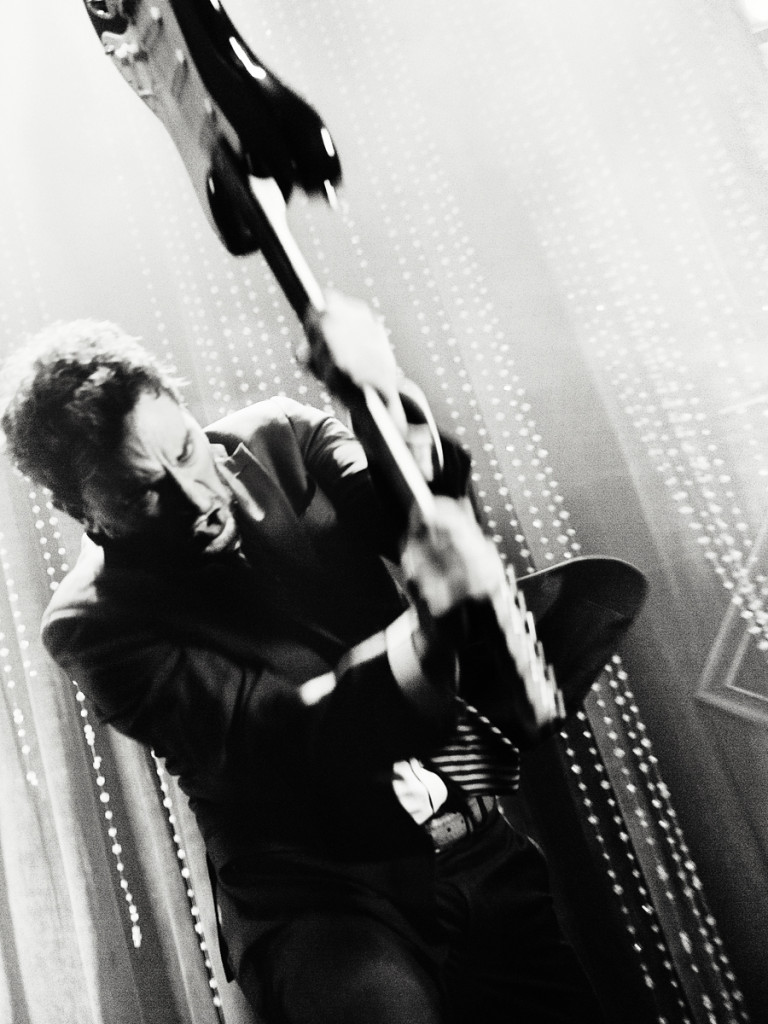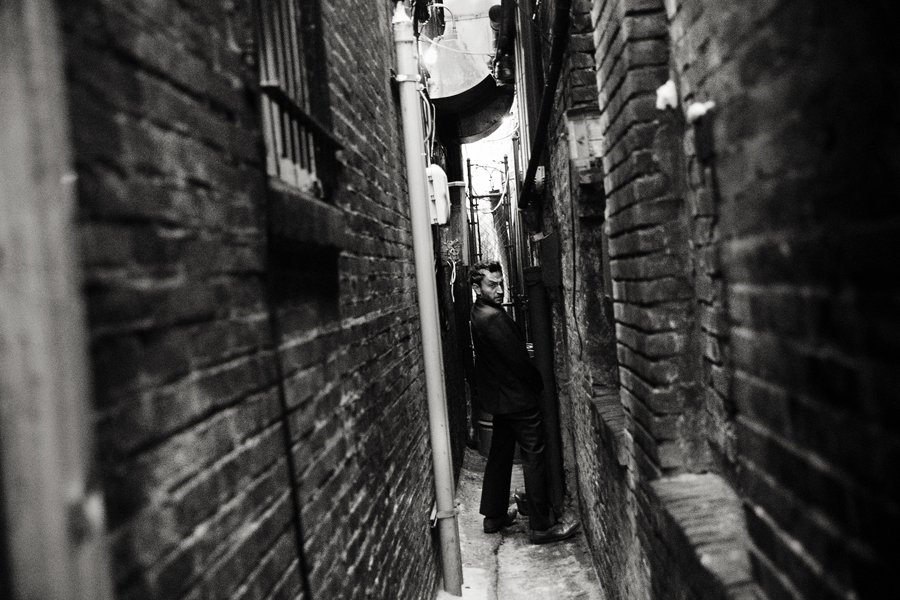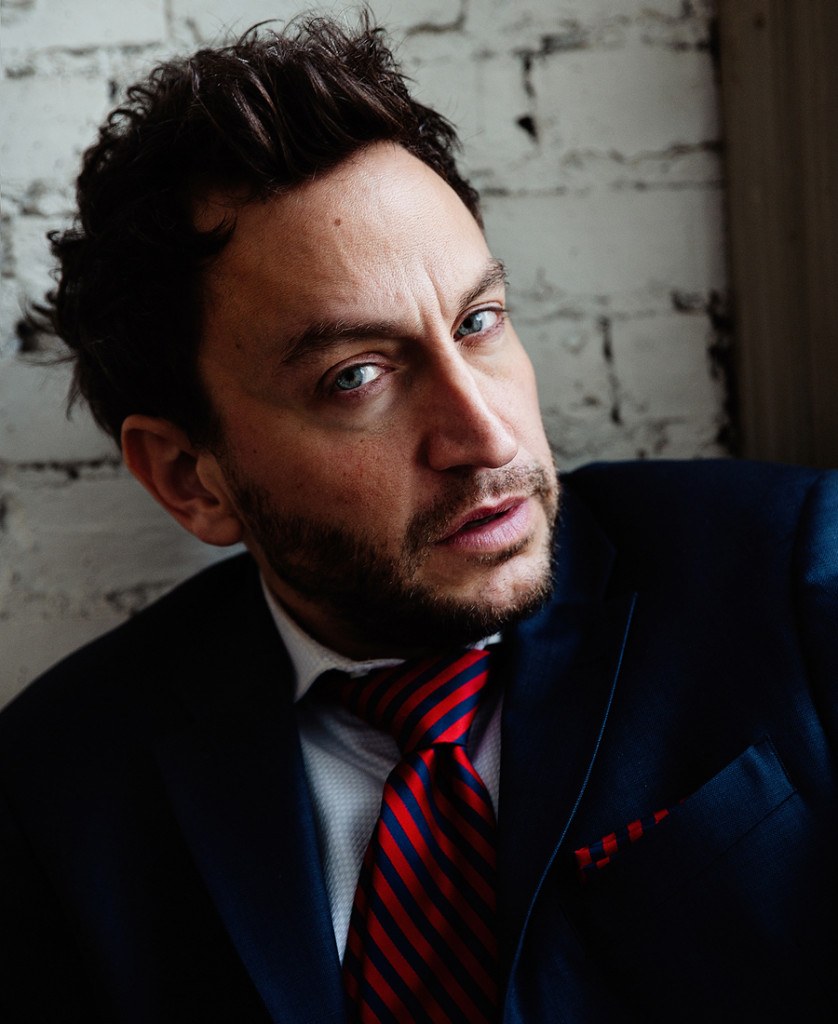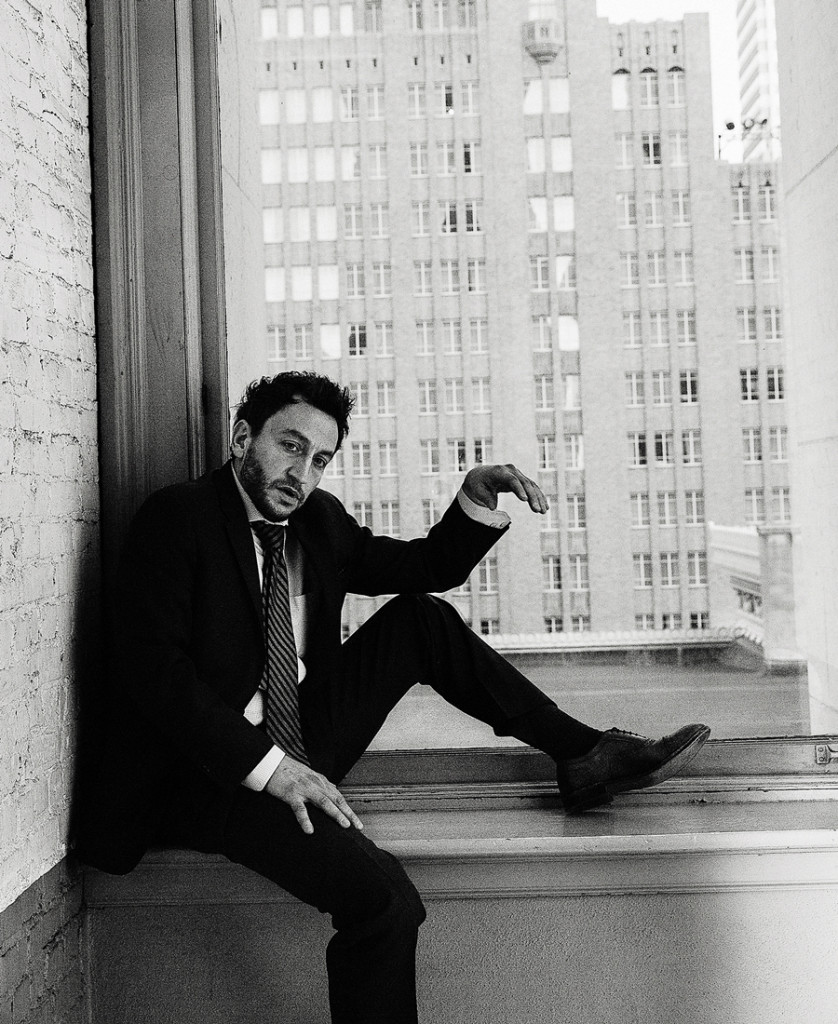
Philadelphia-area attorney Francis Malofiy. Photograph by Bryan Sheffield.
The fact that Philadelphia barrister Francis Alexander Malofiy, Esquire, is suing Led Zeppelin over the authorship of “Stairway to Heaven” is, by any objective measure, only the fourth most interesting thing about him. Unfortunately for the reader, and the purposes of this story, the first, second and third most interesting things about Malofiy are bound and gagged in nondisclosure agreements, those legalistic dungeons where the First Amendment goes to die. So let’s start with number four and work our way backward.
At the risk of stating the obvious, ladies and gentlemen of the jury, let the record show that “Stairway to Heaven” is arguably the most famous song in all of rock-and-roll, perhaps in all of popular music. It’s also one of the most lucrative — it’s estimated that the song has netted north of $500 million in sales and royalties since its 1971 release. Malofiy’s lawsuit, cheekily printed in the same druidic font used for the liner notes of the album Led Zeppelin IV, alleges that Jimmy Page and Robert Plant — Zep’s elegantly wasted guitarist/producer/central songwriter and leonine, leather-lunged lead singer, respectively — stole the iconic descending acoustic-guitar arpeggios of the first two minutes of “Stairway” from “Taurus,” a song with a strikingly similar chord pattern by a long-forgotten ’60s band called Spirit. At the conclusion of a stormy, headline-grabbing trial in 2016 that peaked with testimony from Page and Plant, the jury decided in Zep’s favor.
When the copyright infringement suit was first filed in Philadelphia by Malofiy (pronounced “MAL-uh-fee”) on behalf of the Randy Craig Wolfe Trust — which represents the estate of Randy “California” Wolfe, the now-deceased member of Spirit who wrote “Taurus” — people laughed. Mostly at Malofiy. The breathless wall-to-wall media coverage the trial garnered often painted him as a loose-cannon legal beagle, one part Charlie Sheen, one part Johnnie Cochran. “Everybody kind of dismissed me as this brash young lawyer who didn’t really understand copyright law,” he says, well into the wee hours one night back in December, sitting behind a desk stacked four feet high with legal files in the dank, subterranean bunker that is his office.
Hidden behind an unmarked door on the basement floor of a nondescript office building in Media, the law firm of Francis Alexander LLC is a pretty punk-rock operation. The neighbors are an anger management counselor and a medical marijuana dispensary. “I think of us as pirates sinking big ships,” Malofiy, who’s 41, brags. Given the sheer number of death threats he says he’s received from apoplectic Zep fans, the fact that mysterious cars seem to follow him in the night, and his claim to have found GPS trackers stuck to the bottom of his car, the precise location of his offices remains a closely guarded secret. Failing that, he has a license to carry, and most days, he leaves the house packing a .38-caliber Smith & Wesson.
While most lawyers are sleeping, Malofiy is working through the night to defeat them, often until sunrise, fueled by an ever-present bottle of grape-flavored Fast Twitch as he chain-chews Wrigley’s Spearmint gum and huffs a never-ending string of Marlboro menthols. We’ve been talking on the record for going on eight hours, and Malofiy shows no signs of fading; in fact, he’s just announced the arrival of his third wind.
He has a pretty good ‘fuck you’ attitude that comes from an inner confidence. He might have had a little too much early on,” attorney Jim Beasley Jr. says of Malofiy. “If you piss the judge off with your pirate act, the judge can make it difficult for you. Sometimes you could avoid all that by not swinging your pirate sword around.
Talk turns to the distinctly pro-Zep tenor of the media coverage of the “Stairway” trial. “I was a punch line for jokes,” he says, spitting his gum into a yellow Post-it and banking it into the trash for, like, the 42nd time. Nobody’s laughing now, least of all Page and Plant. Nor, for that matter, is Usher. Back in October, at the conclusion of a dogged seven-year legal battle marked by a bruising string of dismissals and sanctions, Malofiy won a $44 million verdict — one of the largest in Pennsylvania in 2018 — for a Philadelphia songwriter named Daniel Marino who sued his co-writers after being cut out of the songwriting credits and royalties for the song “Bad Girl” from the R&B heartthrob’s 2004 breakout album, Confessions, which sold more than 10 million copies.
Also, in late September of last year, the U.S. Ninth Circuit Court of Appeals ruled in favor of Malofiy’s appeal of the 2016 “Stairway to Heaven” verdict and ordered a new trial on the grounds that the court “abused its discretion” when the judge refused to allow Malofiy to play a recording of “Taurus” for the jury. (Members were only allowed to hear an acoustic-guitar rendition played from sheet music.) The retrial is expected to begin in the next year, and Page and Plant, along with bassist John Paul Jones, are again anticipated to take the stand. Copyright experts say Led Zeppelin — which has a long history of ripping off the ancient riffs and carnal incantations of wizened Delta bluesmen and only giving credit when caught — should be worried.
Malofiy, who calls Zep “the greatest cover band in all of history,” will go to trial armed with reams of expert testimony pinpointing the damning similarities between the two songs — not just the nearly identical and atypical chord pattern, but the shared melodic figurations, choice of key and distinctive voicings. He’ll also show the jury that Page and Plant had ample opportunity to hear “Taurus” when Zep opened for Spirit on their first American tour in 1968, two years before they wrote and recorded “Stairway.”
“Most big companies rely on the concept of wearing you down, forcing you to do so much work it literally drives you broke,” says Glen Kulik, a heavy-hitter L.A.-based copyright lawyer who signed on as Malofiy’s local counsel when the Zep case was moved to federal court in California. “If you have any chance of standing up to them, it’s going to require an incredible amount of persistence, confidence, and quite a bit of skill as well, and Francis has all those things in spades.” And Kulik would know, having successfully argued a landmark copyright infringement case before the Supreme Court in 2014 that paved the way for the Zeppelin suit.

Francis Malofiy. Photograph by Bryan Sheffield.
Ultimately, Malofiy doesn’t have to prove Led Zeppelin stole Spirit’s song; he just has to convince a jury that’s what happened. Assuming the trial goes forward — and that this time, he’s allowed to play recordings of both songs for the jury — there will be blood. Because contrary to his hard-won rep as a bull in the china shop of civil litigation, Malofiy possesses a switchblade-sharp legal mind, an inexhaustible work ethic, and a relentless, rock-ribbed resolve to absorb more punches than his opponents can throw. He’s a ruthlessly effective courtroom tactician with a collection of six-, seven- and eight-figure verdicts, not to mention the scalps of opposing counsel who underestimated his prowess. “I don’t plink pigeons; I hunt lions and tigers and bears,” he says. The big game he’s targeted in the past decade include deep-pocketed transnational corporations like Volvo (an epic seven-year case that ended in an undisclosed settlement) and Hertz (against whom he won a $100,000 verdict).
In the arena of civil litigation, where the odds are increasingly stacked against plaintiffs, Malofiy claims to have never lost a jury trial, and that appears to be true. “I have lost twice — in the Zeppelin case and a lawsuit against Volvo — but got both decisions reversed on appeals,” he says, unsheathing a fresh stick of Wrigley’s. “Now, the same people that were asking me for years why I’m doing it are asking me how I did it.”
If Malofiy prevails in the coming “Stairway” retrial, he’ll completely shatter the Tolkien-esque legend of the song’s immaculate conception — that it was birthed nearly in toto during a mystical retreat at a remote Welsh mountain cottage called Bron-yr-aur, to which many a starry-eyed Zep disciple has made a pilgrimage once upon a midnight clear when the forests echo with laughter. It will be like proving that da Vinci didn’t paint the Mona Lisa, that Michelangelo didn’t sculpt David. Barring a last-minute settlement, many legal and copyright experts predict that Malofiy may well emerge victorious, and credit for the most famous rock song in the world will pass from the self-appointed Golden Gods of Led Zeppelin to some obscure, long-forgotten (and not even very good) West Coast psych band, along with tens of millions in royalties, effectively rewriting the sacred history of rock-and-roll. And the man who will have pulled off this fairly miraculous feat of judicial jujitsu is the enfant terrible of Philadelphia jurisprudence. •
Malofiy hates wearing a suit and tie. Outside the courtroom, he dresses like a rock star masquerading as a lawyer: a crushable black trilby perched at a jaunty angle atop a blue bandana, a collarless black and orange leather Harley jacket, and a pair of beat-to-fuck brown Wesco boots, unlaced. “I’m always in jeans and boots when I meet new clients,” he says. “I warn them up front: ‘If you want a fancy lawyer in a suit, you should go elsewhere.’”
The barrier to entry for new clients at Francis Alexander LLC is steep, because Malofiy doesn’t take on new cases so much as he adopts new causes. A case has to register on a deeply personal level if he’s going to eat, sleep, and fight to the death for it for the next five to seven years.
“Lawyers have an ethical responsibility to advocate zealously for their clients,” says attorney Max Kennerly, who’s worked with Malofiy on a number of cases. “But frankly, in this business, a lot of lawyers play the odds and just do a ‘good enough’ job on a bunch of cases. Sometimes they win, and sometimes they lose. Francis really throws himself into his cases.”
After 10 years of struggle, things finally seem to be breaking Malofiy’s way. Fat checks from cases settled long ago are rolling in, alleviating some fairly crippling cash-flow issues, and big cases just keep falling out of the sky — more than his two-lawyer outfit can field. They need to staff up, stat. Malofiy wants to hire some young bucks fresh out of law school — preferably Temple — as force multipliers in his quest to hold the powerful accountable on behalf of the powerless. “Most kids in law school right now will never see the inside of a courtroom,” he says. “Law schools don’t want to teach you how to change the system; they want to load you up with debt so you have to go do grunt work for some corporate law firm that specializes in maintaining the status quo.”

Francis Malofiy. Photograph by Bryan Sheffield.
Malofiy doesn’t have a website. He doesn’t do social media. He doesn’t trawl the watering holes of the rich and powerful. He doesn’t even have a business card. Thanks to the notoriety and name recognition that came with the Zeppelin trial, new clients chase him. He just got off the phone with a Brooklyn puppet maker who wants him to sue the band Fall Out Boy for alleged misuse of two llamas — Frosty and Royal Tea — that it created. Right now, he’s on a conference call with a trio of British songwriters who want Malofiy to sue the Weeknd for allegedly lifting a key section of their song “I Need to Love” for a track called “A Lonely Night” on his 2016 Starboy album, which has sold more than three million copies to date.
“Why are you guys calling me?” he asks.
“We’re looking for an honest person fighting for ordinary working people,” says Billy Smith, one of the Brit songwriters in question. Malofiy clearly likes the sound of that. After thinking it over for a few moments, he tells them he’ll take their case and gives them his standard new-client spiel. “I can’t promise we’ll win, but I can promise I won’t turn yellow when things turn bad. I won’t put my tail between my legs and run,” he says. “If there is any bad news, you will hear it from me first.”
His teeth have been bothering him for days, and near the end of the call, one of his dental caps comes loose. He spits it out, and it skitters across his desk before he traps it under his palm. Most lawyers would be mortified. Malofiy thinks it’s hilarious. “I got teeth like you people,” he says to the Brits. Everybody laughs.
Many people mistake Malofiy’s unconventionality as a design flaw when it’s actually a feature. “I think that’s an incredibly important part of what makes him so good as an attorney,” says A.J. Fluehr, 33, Malofiy’s right-hand man, co-counsel and, though eight years his boss’s junior, voice of reason. “Because he’s so unorthodox, I believe it causes a lot of other attorneys to underestimate him and think, ‘Oh, he’s not serious; he doesn’t know what he’s doing.’ All of sudden, there’s a massively serious case against them.”
Even some of the defense lawyers who’ve done battle with Malofiy begrudgingly acknowledge his chops. “I’ve known Francis for four years now. He is difficult to deal with but a fierce advocate for his clients and his cause,” says Rudolph “Skip” DiMassa, a partner at Duane Morris. “Calling him ‘abrasive’ would be putting it mildly. But he wears it like a badge of honor that he is not like all the other lawyers in town.”
When I read that and similar assessments from other lawyers back to Malofiy, he chalks them up to blowback for the heresy of Robin Hooding a corrupt status quo. “I have a target on my back because I sue big corporations, politicians, big law firms. Hell, I sued DA Seth Williams,” he says one night at the Irish Pub, as he’s nursing a screwdriver he’ll chase with a root beer. “When you start stepping on toes and suing the wrong people and get a few million shifted from those who have it to those who don’t — that’s where the change happens; that’s where you make a difference. And there is a price you have to pay for that.” •
According to family lore, Francis Malofiy’s maternal grandfather was murdered by Nazis in occupied Greece; his great-grandmother had to cut the body down from a tree and carry it home on the back of a mule. Concurrently, his paternal grandfather was murdered by Nazis in Ukraine, while his father and grandmother were frog-marched to camps in Germany. Some things can never be forgotten or forgiven. That’s why Malofiy is always kicking against the pricks. A slight child, he was often bullied at school, and after a brief experiment with turning the other cheek, he started fighting back. Hard. He recalls the day that a bully was picking on a girl half his size; young Francis cold-cocked him and threw him into a closet door. The kid had to be taken out on a stretcher. After that, the bullies moved on to easier prey. “I was always fighting for the little guy, even back then,” he says.
In the third grade, friends turned him on to Poison’s Look What the Cat Dragged In and Bon Jovi’s Slippery When Wet, indelibly imprinting the spandexed bikers-and-strippers aesthetic of ’80s hair-metal onto his psyche. He started channeling the energy he once put into beating back bullies into beating the drums. One day in the sixth grade, he came home to tell his dad about a band all the kids were into: “The Led Zeppelins.”
“He said, ‘No, son, it’s just Led Zeppelin.’”
“No, I’m pretty sure it’s the Led Zeppelins.”
So his father, who’d seen the band at the Electric Factory, drove Francis to the record store at the Granite Run Mall, where the clerks set him straight. His father bought the four-cassette Zep box set that had just come out. On the way home, Malofiy heard “Whole Lotta Love” for the first time, and before the song even ended, it was official: Led Zeppelin was his favorite band. When he was in high school, his drum teacher gently broke the news that Zep didn’t exactly, um, write all their own music — that key parts of their iconic songs had been cherry-picked from old, obscure blues recordings. “I said, ‘C’mon, don’t talk shit about Jimmy Page!’” Malofiy recalls. Then his teacher played him the Willie Dixon-penned Muddy Waters track “You Need Love” — which is what “Whole Lotta Love” was called before Zep hijacked the lyrics and the riff and Frankensteined them into the gloriously scuzzy heavy-metal Viking porno movie for the ears we’ve come to know and love. It was hard for Francis to process, and even harder when he was tipped to the uncanny similarity between Spirit’s “Taurus” and “Stairway.” Still, the spell Zep cast over him remained unbroken.

Francis Malofiy. Photograph by Bryan Sheffield.
As a young teenager, he built go-karts, dirt bikes and small-block Chevys. To make spending money for guitars and records, he started buying beater cars, fixing them up, and flipping them for quadruple what he paid for them. He almost didn’t graduate from high school because he’d played hooky too many times, to go fishing or work on cars or play guitar. When he finally got his high-school diploma, he raced home from school to show his mother in his Chevy S-10 lowrider. Tearing ass on the backcountry roads of Media, he blew past a cop who immediately lit up his cherry top and gave pursuit. Soon, one cop car became two, then three, until there were five cars tailing him.
Much to his parents’ dismay, his run-ins with the law became common. They were never for anything all that serious, just the usual teen-rebel monkeyshines: fighting, speeding, the occasional high-speed car chase. He got a big wake-up call in 1998 when his beloved Uncle Nick — a.k.a. Nicholas “The Greek” Vasiliades — was handed a life sentence for running a high-volume meth lab in a warehouse in Manayunk that supplied the drug networks of the Pagans and the Mafia, as well as for his 50-gun arsenal of illegal weaponry. Malofiy was devastated. “I was going down a bad path,” he says. “My uncle pulled me aside and said, ‘You’re smart enough to do it the right way. You need to step away.’” •
Malofiy took the warning to heart and focused on getting a college education, graduating from Penn State in 2000 with a degree in finance. After college, he went back home to Media and his true loves: cars, girls and heavy metal. With a revolving cast of musicians, he formed multiple go-nowhere suburban hard-rock bands with cringe-y names like Prada G and Sluts ’n Slayers. Unimpressed, his parents urged him to enroll in law school. Eventually he relented, forging this pact: He would go to law school if he: a) could do whatever he wanted with the unfinished basement of his parents’ home (i.e., build a high-end recording-studio-cum-man-cave tricked out with a kitchen, bedroom and bathroom); and b) nobody hassled him about having long hair, rocking out and chasing girls. Deal. Malofiy took the LSATs and scored just south of 160 — hardly off the charts, but good enough to get into Temple, where he found himself drawn to copyright law.
He graduated from law school in December of 2007 and took the bar exam the following July. On the night of August 16, 2008, he stopped into the Liberty Bar at 22nd and Market with his then-girlfriend. It was crowded, but they found a table in the back. After ordering drinks, they started getting static from a group of three young men in ball caps and white t-shirts. “Three drunken jerkoffs, white privilege out the ass,” says Malofiy. According to Malofiy’s testimony, the trio mocked his bandana and called him “cunt,” “pussy” and a “dirty spic.” (It was summer; Malofiy was tan.) According to Malofiy, at some point the men apologized and the situation seemed defused, but then one of them grabbed Malofiy’s girlfriend’s ass. “I said, ‘That’s it. Follow me out,’ and made for the door,” Malofiy says, but he was blocked by a member of the group. As they stood chest-to-chest, Malofiy says, the man struck him twice. Finally, Malofiy, who boxed in college, unloaded with a right cross that landed squarely on the guy’s left cheekbone, shattering the glass still clenched in Malofiy’s fist.
The man suffered a deep gash in his cheek that would require 150 stitches and reconstructive surgery. Malofiy nearly severed the tendons in his thumb. Bleeding profusely, he had his girlfriend drive him to the emergency room at Penn Presby to get stitched up and then to Central Detectives to file a criminal complaint.
Two months later, in October, notice came in the mail that he had passed the bar. His mother was ecstatic and insisted on driving him to the Pittsburgh office of the Prothonotary of the Supreme Court of Pennsylvania immediately to obtain his law license rather than wait two weeks for the formal ceremony. When they got home the next day, Malofiy got a call from Central Detectives, who said they had a “body warrant” for his arrest on aggravated assault and related charges stemming from the Liberty Bar fight. The next day, he turned himself in and spent a night in jail awaiting a bail hearing. Had he not gone to Pittsburgh at his mother’s behest, it’s unlikely he’d have gotten his law license with a felony arrest on his record.
Malofiy’s first case as a newly minted lawyer would involve defending a client staring down decades in prison if convicted: himself. Heeding the maxim that a man who is his own lawyer has a fool for a client, Malofiy hired Sam Stretton, one of the most respected criminal defense attorneys in the city. Malofiy took the stand and delivered an impassioned defense of his actions. “He had already hit me twice, blocked my exit-way,” he testified. “I was scared for my safety and my girlfriend’s safety, and his friends had just yelled ‘Fight!’ and came up to me with fists drawn. I thought I had no other option.” The jury found him not guilty on all charges. •
“Welcome to Hogwarts,” Malofiy jokes as he shows me around the vast oak and stained-glass room that houses the law library at the Beasley Firm, possibly the most fearsome and feared personal-injury law firm in the city, where he worked, in an of-counsel capacity, from 2012 to 2014.
Fresh out of law school and still wet behind the ears, Malofiy showed up one day in search of mentoring. Granted an audience with Jim Beasley Jr., one of the most successful plaintiff’s attorney in the city, Malofiy ended up with a promise of rent-free office space, the phone extension 666, and a commitment to help finance some of the highly ambitious cases he was mounting — a product-liability suit against Volvo, and a breach-of-contract suit, against a marble manufacturer that had screwed his client out of an ownership share, that resulted in a $4.2 million verdict — not to mention the Usher case. “Jim was like, ‘I keep getting calls from defense lawyers saying That kid’s the fucking devil, so you must be doing something right,’” Malofiy recalls.
During Malofiy’s tenure at Beasley, he took out a controversial full-page ad in this magazine that depicted him crashing through a courtroom in a hot rod, looking every bit James Dean in Rebel Without a Cause. Many members of Philadelphia’s uptight, buttoned-down legal community thought it was disrespectful. “Everyone was outraged, but I thought it was funny,” says Beasley. “He has a pretty good ‘fuck you’ attitude that comes from an inner confidence. He might have had a little too much of that early on, but I think he’s throttled back a bit. So many of a judge’s decisions are ties and jump-balls that are not reversible, and if you piss the judge off with your pirate act, the judge can make it difficult for you. Sometimes you could avoid all that by not swinging your pirate sword around.”
Malofiy has learned this the hard way. In 2015, a three-judge panel voted to suspend his license to practice law in U.S. District Court in the Eastern District of Pennsylvania for improper conduct in the Usher case — despite the fact that the special prosecutor recommended what amounted to a slap on the wrist: a reprimand.
“It’s highly unusual that they would disregard the disciplinary recommendations of the special prosecutor after he has heard the facts,” says Stretton. The matter is currently on appeal before the Third Circuit. •
At Malofiy’s insistence, I’ve been tailing him for the better part of a month: from a big-dollar NDA’d settlement in a judge’s quarters, to a Port Richmond dive bar called Chuckles, to a Bucks County gun shop where he plunked down $1,729 for a handsome Benelli shotgun (a gift for his right-hand man Fluehr), to a back-alley strip bar in Center City and the disused factory under the Commodore Barry Bridge that he’s purchased and plans to renovate into office space, living quarters and a beer garden. I watched him hide his $82,000 Land Rover from the repo man (“It’s all a misunderstanding”) and then, days later, saw a pile of white letter-size envelopes stacked on his desk, each containing what looked to be thousands in cash. What I have come to learn is this: When you write about lawyers, there is so much you can’t write about lawyers.
Malofiy slowly, methodically and unflinchingly parceled out the most personal details of his backstory — the good, the bad and the ugly — as I incrementally earned his trust. But always on his timetable, not mine. It could be exasperating, but by the end, I discovered the method to his madness: He’d been pacing his revelations as he would a trial presentation. And now we’re reaching the crescendo of his closing argument — the big reveal.

Francis Malofiy. Photograph by Bryan Sheffield.
It’s a few clicks shy of midnight at Malofiy’s house in Media on a Sunday night shortly before Christmas. In the morning, he’s jetting off to an auction in London to bid on the Helios recording console that captured “Stairway to Heaven” for the ages. (Malofiy, true to form, won’t confirm that he won or lost the auction.) Though he’s been locked in a nasty four-year legal fight with Led Zeppelin, they’re still his favorite band.
Malofiy called to insist that I come to his house tonight. “Why? What for?” I demanded. He said he wanted to show me something I could only see there. I begged off, explaining that this article was due in the morning and I already had more than I could use. But he insisted, promising it would be worth my while. He doesn’t disappoint. He tells me to open the freezer. There’s a bottle of Tito’s vodka, an ice tray, and half a lemon on a plate with a yellow plastic knife. “That’s the lemon Robert Plant squeezed into his tea when we deposed him in London back in 2016,” he claims. This is deeply ironic and, if you’re acquainted with the role lemons play in Plant’s legend, cosmically hilarious. One of Led Zeppelin’s most infamous tracks is “The Lemon Song,” a sultry blooze ramble from 1969’s deathless Led Zeppelin II stitched together from pieces of Howlin’ Wolf’s “Killing Floor” and Robert Johnson’s “Travelling Riverside Blues.” (Zep settled a 1972 copyright suit over the Howlin’ Wolf portion of the song.) In the fifth verse, Plant sings:
Squeeze me baby, till the juice runs down my leg
The way you squeeze my lemon, ah
I’m gonna fall right out of bed
By swiping that lemon rind at the deposition, Malofiy stole Robert Plant’s metaphoric penis the way Prometheus stole fire from the gods. Zep famously invoked the mythic “Hammer of the Gods” from Norse legend. For Jimmy Page, that hammer was his guitar, but for Plant it was his, um, mighty lemon tree.
Incredible though it may seem, Malofiy says he’s kept the lemon on ice for the past three years and had it in his briefcase like a talisman when he gave oral arguments for what proved to be his successful appeal of the 2016 “Stairway” verdict. He has every intention of taking it to the retrial that will, barring unforeseen developments, commence in the next year.
“Robert Plant is always going on about his lemon, and at the deposition he made a big deal out of slicing it up and squeezing it into his tea and then sucking on the rind,” he says with a cat-who-ate-the-canary grin. “Jimmy Page famously dabbled in black magic and was always going on about Aleister Crowley, and I said to myself, ‘If they are going to use black magic to try to beat me on technicalities — well, two can play at that game.’”
Published as “The Devil’s Advocate” in the February 2019 issue of Philadelphia magazine.
Original article from: www.phillymag.com
Published as “The Devil’s Advocate” in the February 2019 issue of Philadelphia magazine.
